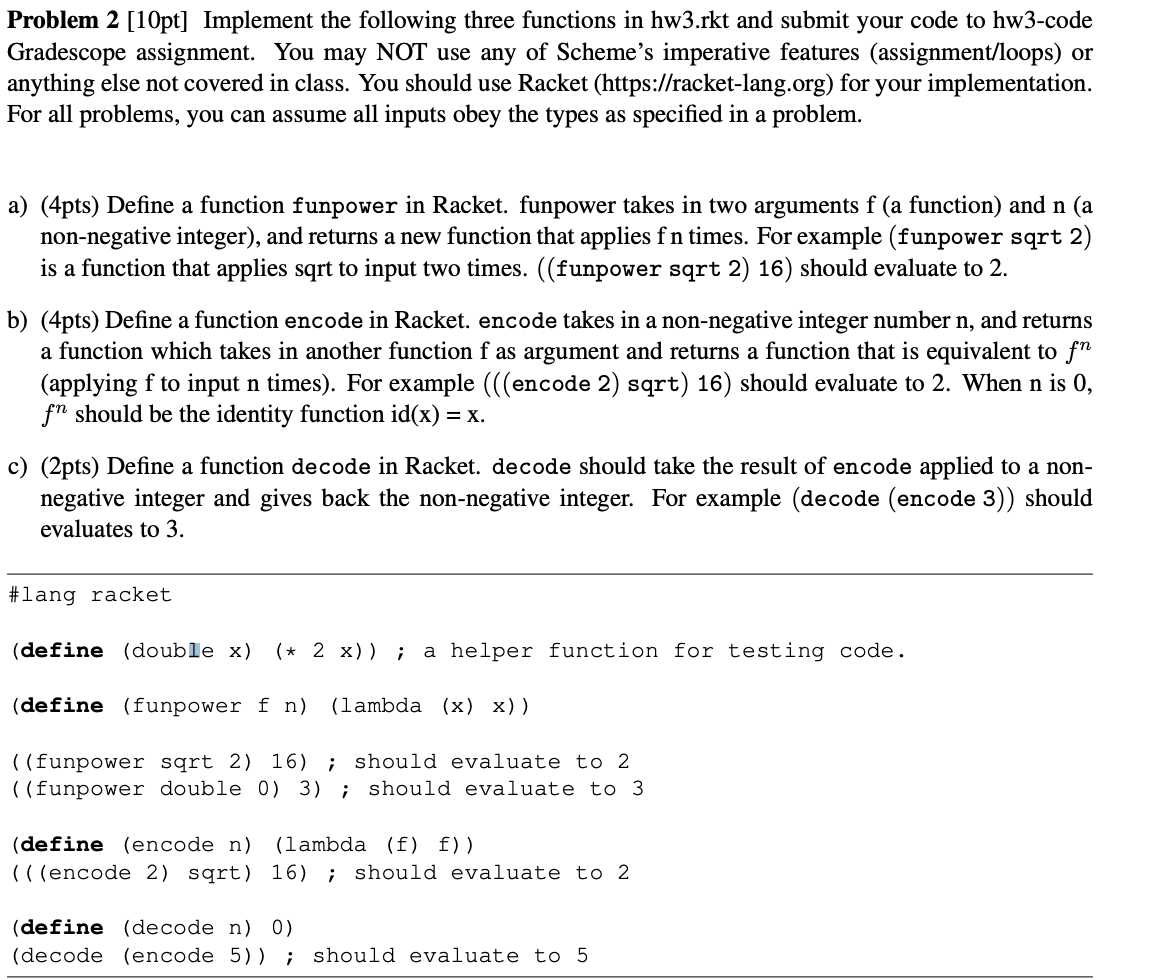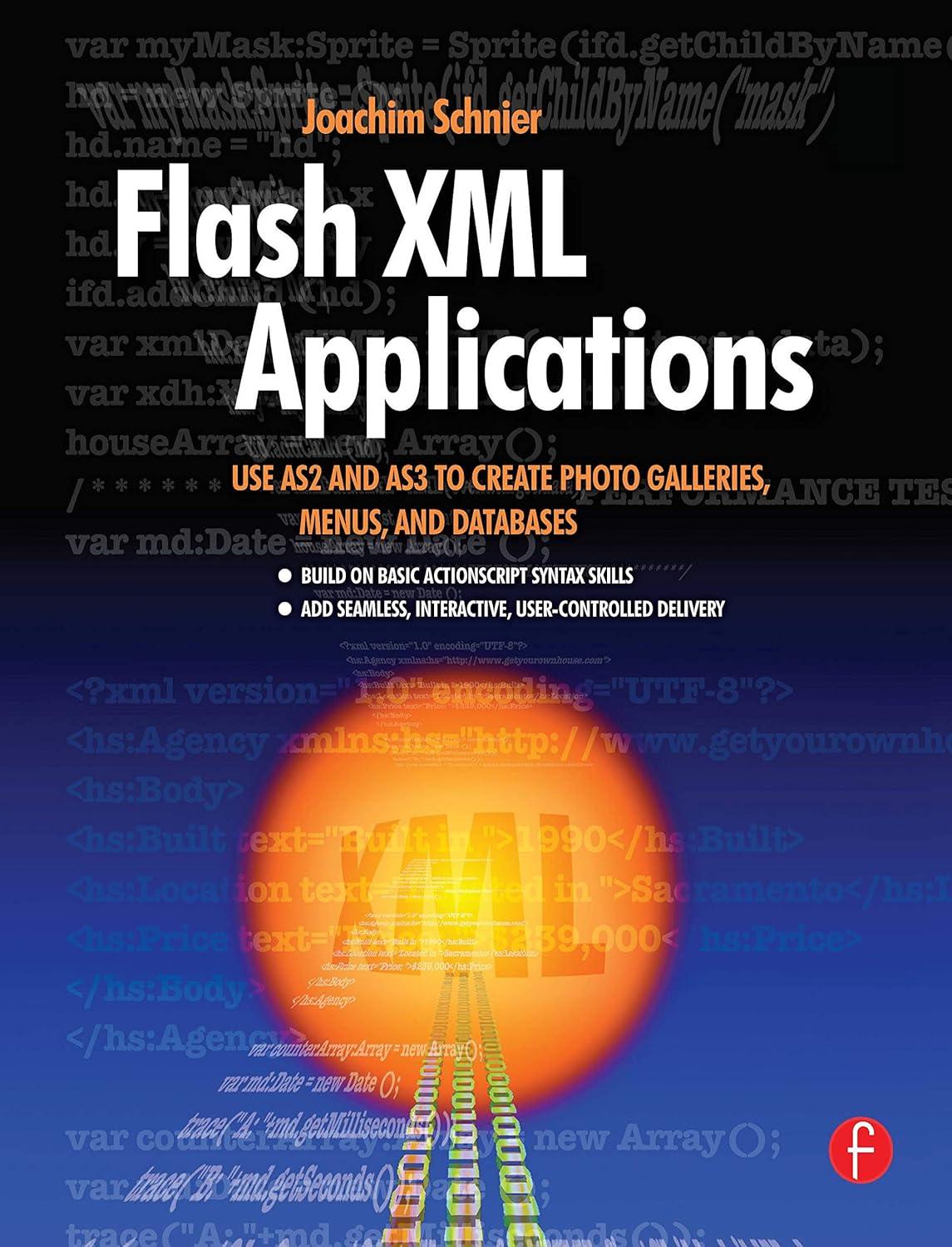 should be written in racket
should be written in racket
Problem 2 [10pt] Implement the following three functions in hw3.rkt and submit your code to hw3-code Gradescope assignment. You may NOT use any of Scheme's imperative features (assignment/loops) or anything else not covered in class. You should use Racket (https://racket-lang.org) for your implementation. For all problems, you can assume all inputs obey the types as specified in a problem. a) (4pts) Define a function funpower in Racket. funpower takes in two arguments f (a function) and n (a non-negative integer), and returns a new function that applies f n times. For example (funpower sqrt 2) is a function that applies sqrt to input two times. ((funpower sqrt 2) 16) should evaluate to 2. b) (4pts) Define a function encode in Racket. encode takes in a non-negative integer number n, and returns a function which takes in another function f as argument and returns a function that is equivalent to fr (applying f to input n times). For example (((encode 2) sqrt) 16) should evaluate to 2. When n is 0, fr should be the identity function id(x) = x. c) (2pts) Define a function decode in Racket. decode should take the result of encode applied to a non- negative integer and gives back the non-negative integer. For example (decode (encode 3)) should evaluates to 3. #lang racket (define (double x) (* 2 x)) ; a helper function for testing code. (define (funpower fn) (lambda (x) x)) ((funpower sqrt 2) 16) ; should evaluate to 2 ((funpower double 0) 3) ; should evaluate to 3 (define (encode n) (lambda (f) f)) (((encode 2) sqrt) 16) ; should evaluate to 2 (define (decode n) 0) (decode (encode 5)) ; should evaluate to 5 Problem 2 [10pt] Implement the following three functions in hw3.rkt and submit your code to hw3-code Gradescope assignment. You may NOT use any of Scheme's imperative features (assignment/loops) or anything else not covered in class. You should use Racket (https://racket-lang.org) for your implementation. For all problems, you can assume all inputs obey the types as specified in a problem. a) (4pts) Define a function funpower in Racket. funpower takes in two arguments f (a function) and n (a non-negative integer), and returns a new function that applies f n times. For example (funpower sqrt 2) is a function that applies sqrt to input two times. ((funpower sqrt 2) 16) should evaluate to 2. b) (4pts) Define a function encode in Racket. encode takes in a non-negative integer number n, and returns a function which takes in another function f as argument and returns a function that is equivalent to fr (applying f to input n times). For example (((encode 2) sqrt) 16) should evaluate to 2. When n is 0, fr should be the identity function id(x) = x. c) (2pts) Define a function decode in Racket. decode should take the result of encode applied to a non- negative integer and gives back the non-negative integer. For example (decode (encode 3)) should evaluates to 3. #lang racket (define (double x) (* 2 x)) ; a helper function for testing code. (define (funpower fn) (lambda (x) x)) ((funpower sqrt 2) 16) ; should evaluate to 2 ((funpower double 0) 3) ; should evaluate to 3 (define (encode n) (lambda (f) f)) (((encode 2) sqrt) 16) ; should evaluate to 2 (define (decode n) 0) (decode (encode 5)) ; should evaluate to 5
 should be written in racket
should be written in racket





